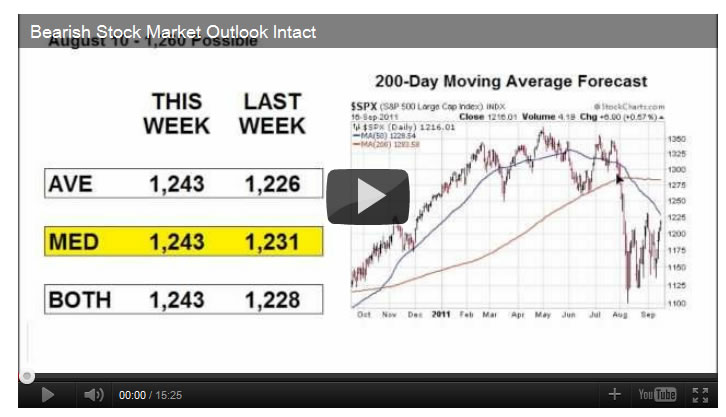Second Greek Bailout May Not Stabilize Markets
Stock-Markets / Stock Markets 2011 Sep 19, 2011 - 03:17 PM GMTBy: Chris_Ciovacco
 Financial markets tend to get fixated on a small number of issues, which often leads to questionable decision making for investors. It is important to look at a scenario where the second Greek bailout package is approved. The immediate question for the markets would become, “Now what?” The odds are fairly low approval of the second bailout will stabilize the bond, currency, and stock markets for an extended period of time. The excerpts below shed light on this concept:
Financial markets tend to get fixated on a small number of issues, which often leads to questionable decision making for investors. It is important to look at a scenario where the second Greek bailout package is approved. The immediate question for the markets would become, “Now what?” The odds are fairly low approval of the second bailout will stabilize the bond, currency, and stock markets for an extended period of time. The excerpts below shed light on this concept:
The Economist – September 17:
The latest, inadequate plan for a second Greek bail-out, agreed at a summit in July, should be thrown away and rewritten.
National Public Radio (NPR) - September 12:
Juergen Michels, chief eurozone economist at Citigroup, says the size of the European rescue fund will very likely have to be increased. He says talk of eurozone defaults in the next year or so is simply realistic. “We’ll probably also have to see defaults,” Michels says. “Greece, at the end of the day, is likely to have one, and it’s also likely to happen for Portugal and Ireland.”
Wall Street Journal (WSJ) – September 19:
But even if Greece gets its money in October, it may only postpone the reckoning: Its budget deficit this year is likely to be 10% compared with a target of 7.5%, says Citigroup. And Athens has barely started on a promised privatization program. The market is convinced the Troika—the name given the team of officials from the International Monetary Fund, European Central Bank and European Commission—will ultimately have to admit that Greece won’t meet its targets. That would pave the way for a default and coercive, rather than voluntary, debt restructuring.
We will maintain a bearish bias until fundamental (mainly Europe) and technical conditions improve. If the S&P 500 breaks below last Monday’s low of 1,136, we would consider adding to our deflationary/bearish stance, which includes bonds (TLT), the dollar (UUP), gold mining stocks (GDX), and a short (SH). As covered in the video below, stock market technicals were raising some yellow flags as of the September 16 close, even before the near waste of time weekend meetings in Europe.
When Bloomberg noted investors have pulled more money from U.S. equity funds since the end of April than in the five months after the collapse of Lehman Brothers, it reinforced our “run for the exits” concerns from September 1:
We believe the psyche of investors is on the verge of reaching a tipping point, which could cause a very rapid decline in asset prices. It is next to impossible to know if and when they will reach for the sell button in unison, but the risk for such an event is elevated and must be considered in all portfolio management decisions. Stocks dropped 34% in twelve trading sessions in 1987. High volatility occurred before that drop, indicating an increased willingness to run for the exits. If you have not noticed, the markets have been volatile recently. An “Oh, my God” type event is difficult to predict, but the conditions are in place to make for an interesting next few months.
-
Copyright (C) 2011 Ciovacco Capital Management, LLC All Rights Reserved.
Chris Ciovacco is the Chief Investment Officer for Ciovacco Capital Management, LLC. More on the web at www.ciovaccocapital.com
Ciovacco Capital Management, LLC is an independent money management firm based in Atlanta, Georgia. As a registered investment advisor, CCM helps individual investors, large & small; achieve improved investment results via independent research and globally diversified investment portfolios. Since we are a fee-based firm, our only objective is to help you protect and grow your assets. Our long-term, theme-oriented, buy-and-hold approach allows for portfolio rebalancing from time to time to adjust to new opportunities or changing market conditions. When looking at money managers in Atlanta, take a hard look at CCM.
All material presented herein is believed to be reliable but we cannot attest to its accuracy. Investment recommendations may change and readers are urged to check with their investment counselors and tax advisors before making any investment decisions. Opinions expressed in these reports may change without prior notice. This memorandum is based on information available to the public. No representation is made that it is accurate or complete. This memorandum is not an offer to buy or sell or a solicitation of an offer to buy or sell the securities mentioned. The investments discussed or recommended in this report may be unsuitable for investors depending on their specific investment objectives and financial position. Past performance is not necessarily a guide to future performance. The price or value of the investments to which this report relates, either directly or indirectly, may fall or rise against the interest of investors. All prices and yields contained in this report are subject to change without notice. This information is based on hypothetical assumptions and is intended for illustrative purposes only. THERE ARE NO WARRANTIES, EXPRESSED OR IMPLIED, AS TO ACCURACY, COMPLETENESS, OR RESULTS OBTAINED FROM ANY INFORMATION CONTAINED IN THIS ARTICLE. PAST PERFORMANCE DOES NOT GUARANTEE FUTURE RESULTS.
Chris Ciovacco Archive |
© 2005-2022 http://www.MarketOracle.co.uk - The Market Oracle is a FREE Daily Financial Markets Analysis & Forecasting online publication.




